Dawa Yangzum, 1st Sherpa Woman on Annapurna without O2, to continue as IFMGA guide
Dawa Yangzum Sherpa - the first Sherpa woman who became the IFMGA guide, speaks to Dream Wanderlust about her trailblazing journey from the valley of Rolwaling to her recent No-Oxygen summit to Annapurna-1(8091m). As a part of an all-female team, Dawa, on 16th April, 2021, climbed her 4th 8000er, since bagging her first one, Everest at 21 in 2012.
Prior to leaving for her upcoming expedition to Dhaulagiri (8167m), Dawa throws light on how much she relishes the glory of training women to climb, in addition to, representing Asian women in a colossally male-centric sport.
Dawa, extensively talks about how the young turks of Nepal, such as Mingma G, who also happens to be her cohort during her training of IFMGA certification, have been transforming the perception of Nepalese climbers; as more independent, not very much under the patronage of westerners, to solidify the contribution of their community in mountaineering history.
"When I started climbing 10 years ago, it was considered a job for someone who doesn't have educational qualification with no choice being left for them. Now, the Nepalese community is accepting that climbing is just a sport and climbers are athletes," explained Dawa.
She paved her own path within a profession, rather majorly androcentric. Dawa represents the spirit of female climbers of Asian descent as a mountain-guide across the globe, alongside being an independent climber. Her 2019 Summit to Makalu is, by far, the fastest summit of Makalu in just 20 hours (Base Camp to Base Camp). Dawa's masterly climbing résumé also includes the summit of Annapurna-1 as the first Sherpa woman of Nepal, 'that too' without the aid of artificial oxygen - the cherry on top. She went on to climb K2 as the youngest woman withal, but her ground-breaking accomplishments as a female first-timer has a lot more to add on to it. She aspires to train more and more female climbers so that they not only take up climbing as a career but also, lean towards guiding. As the youngest woman to have climbed K2, Dawa has been part of a handful of all-women expeditions on 8000ers, and is hopeful of more and more Nepalese women to come forward and join in the climbing fraternity.
This conversation was recorded on 21st April, 2021.
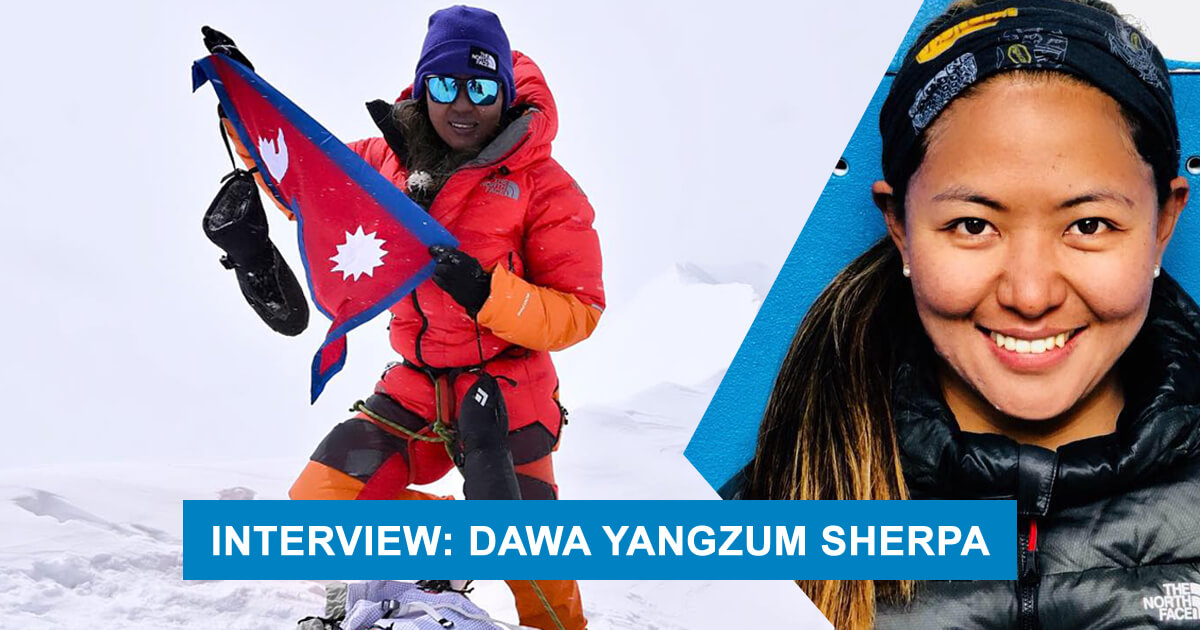
DW: Congratulations on your summit to Annapurna-1 without oxygen! What was your objective behind it?
Dawa: Thank you!
Yeah, Annapurna was my first 8000er without oxygen. My first 8000er, Everest, was in 2012 where I was a high-altitude worker. I did it via South Col. I used to drop the loads and come down. I had been up to 7800-8000m most of the times without oxygen. So I thought that I'd give it a try without it this time here.
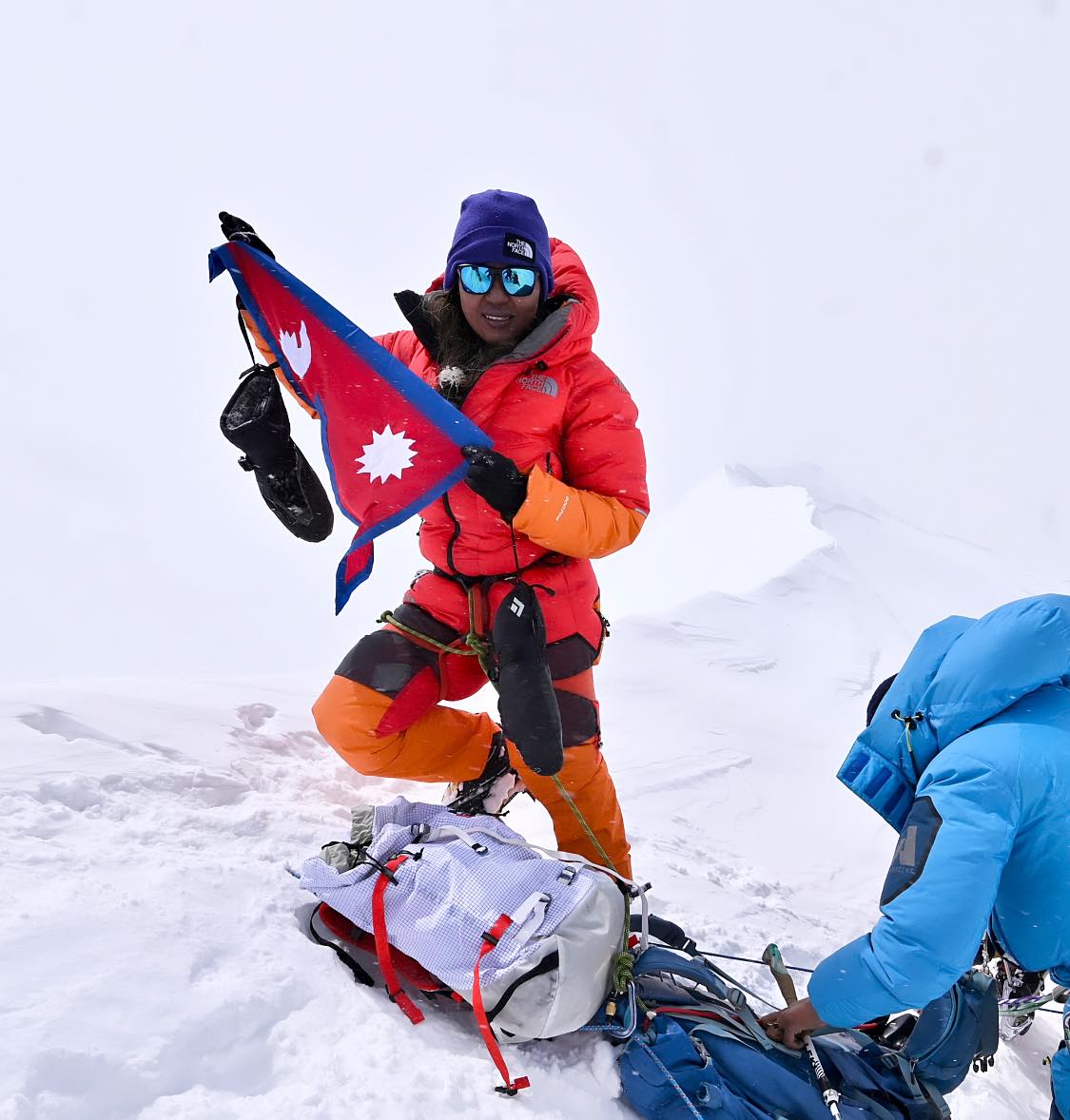
2021: Dawa Yangzum Sherpa on the summit of Annapurna-I
DW: Speaking of Everest, as it was your first 8k at the age of 21, how do you look at your first 8k without oxygen? How different was Annapurna for you than Everest?
Dawa: Everest was my first 8000m peak. Climbing it was, of course, a dream-come-true. Before that, I'd only been to 6000ers and 7000ers. Back in the day, I never thought of doing it without oxygen as I was scared. Now, being into this field for more than 10 years, I felt that my big dream to climb 8ks without oxygen should start. I would like to climb Everest without oxygen as well. Hence, Annapurna was definitely a good start. Obviously, it was tough though. I've been to 7000m peaks but I never knew what my physical limit would be on 8000ers. I always wanted to know that. Obviously, it was hard to breathe in so much cold. You need to prepare your toes and fingers.
It gets much colder without the oxygen. I felt the difference in breathing. I'm thankful that I'm back with everything okay.
DW: You are the only woman from Nepal to have the prestigious IFMGA title for guiding. What difference did it make in your mountaineering career?
Dawa: I think, being an IFMGA guide, is one of the biggest achievements in my career. Even though I climbed K2, Annapurna, Makalu, and other peaks, in a very short time,
I would say that the IFMGA tag made a difference in my mountaineering career.
I really worked hard for it. Because of this, I get to travel the world and guide internationally. It made me very confident to guide in different mountain ranges. Also, representing myself as the first Asian woman to do so, made me very proud. We used to see all the westerners, especially the white women, doing the same job and I thought to myself, "Okay, this must be very different." But it was important for me to represent Asian women as well. It took me a while to complete the IFMGA certification. But I believe after five years of rigorous training, it definitely made me very different than someone who just holds a lot of 8k experiences.
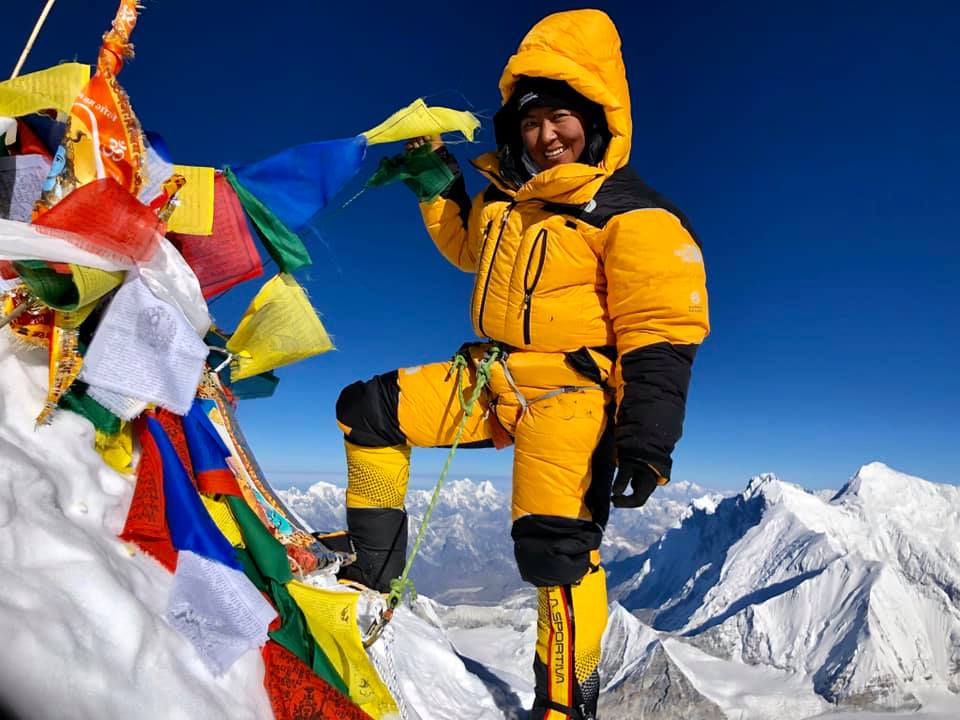
2019: Dawa Yangzum Sherpa on the summit of Makalu
DW: To become the first Nepalese woman with the IFMGA tag, you trained at Rolwaling for over two months which is also where Mingma Gyalje Sherpa hails from. How did your climbing partnership with him begin and shape over time?
Dawa: Yes! In 2012-13, my first IFMGA batch was with Mingma G and my elder brother. There were 20 of us and only 10 got selected. Then, amongst 10, Mingma G was one of my training partners during the course. We trained together for a year but somehow I got failed that time. So yeah, we trained back in the day as guiding aspirants and we know each other since then. We used to practise together on rock and ice. Following that, even our families became very close to one another since my brother and his (Mingma G's) elder sister got married.
But I'd never been on climbing expeditions together with him after the training except K2 in 2014. We were on separate teams but we climbed together. Besides, we've summited other peaks here and there together. This is my first expedition with his team.
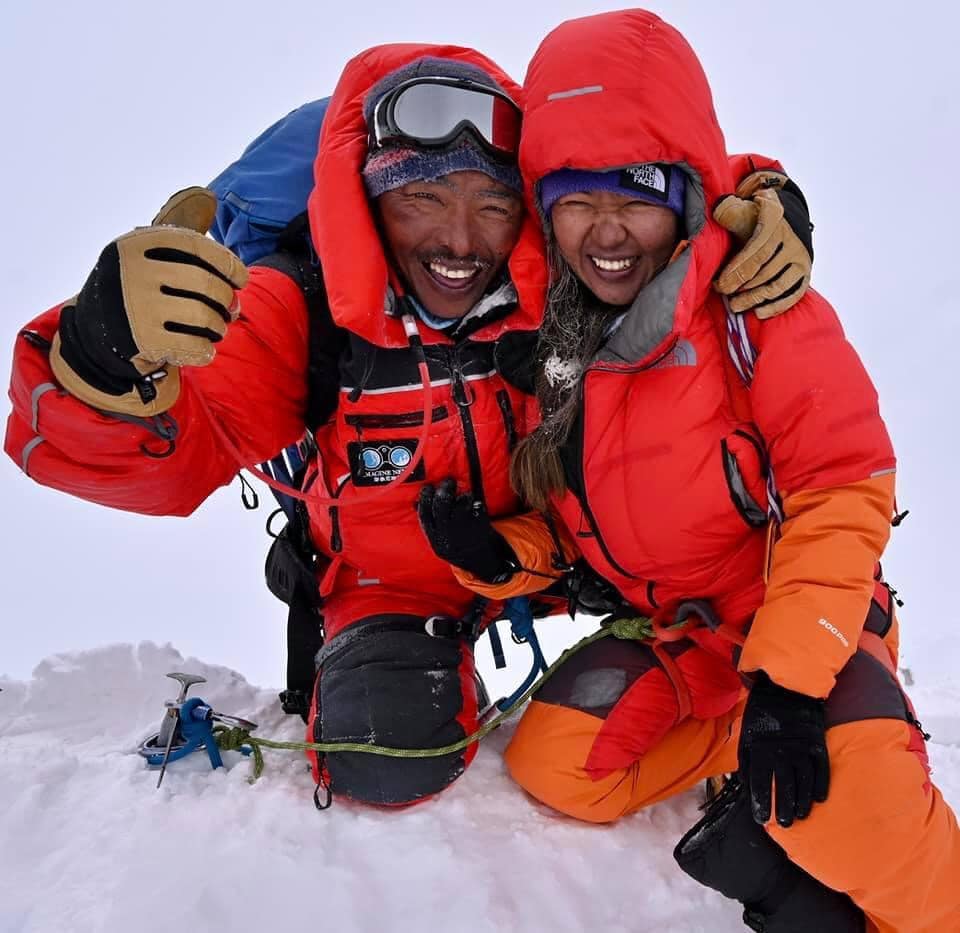
2021: Dawa Yangzum with her brother Dawa Gyalje on the summit of Annapurna-I
Also,
it was my first big expedition with my elder brother and Mingma G. A good decision, I believe.
On 8000ers, we must have someone like Mingma G, who for sure would make a summit.
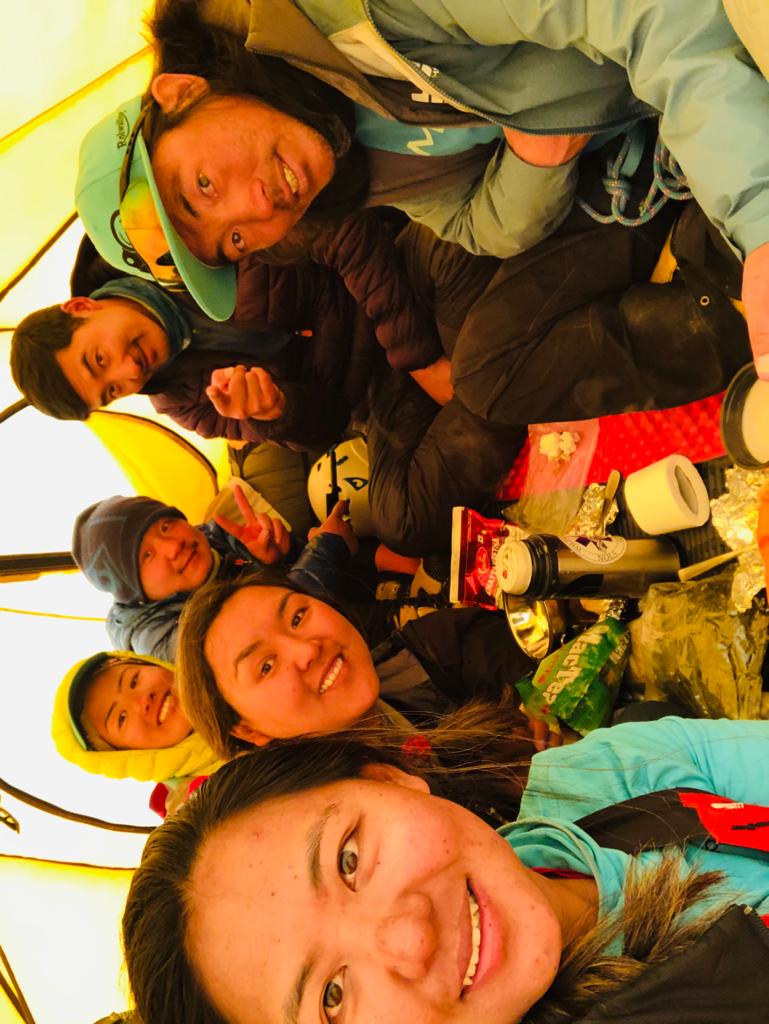
Dawa Yangzum Sherpa with Mingma G [Right] at the Base Camp of Annapurna
DW: Speaking of K2, you were part of the all-women team to K2, shall we consider your women-only expedition to Annapurna-1 as a step forward for more women to make their mark in the mountaineering fraternity? Because, over the years, you've paved a distinctive path as a female guide in a majorly male-dominated sport.
Dawa: Yes! It was hard, in the beginning, to become a mountain guide and represent women. I've grown up in the mountains. I had a supportive family. Otherwise, guiding all over the world and being an adventurer, is very culturally difficult in Nepal. Really hard. I have been very fortunate to have good mentors around me. Conrad Anker was one of my biggest mentors in my life and so many others. They all made it happen for me.
Yeah, K2 was an all-women team but we, of course, were supported by men. After that, our team of Annapurna-1 consisted of six women. That was also a big thing for us. I wasn't planning to climb Annapurna-1 this time though. But when I saw so many women are going for the summit, I was very excited, as well as encouraged by them. It felt like, "If they can do it, so can I!"
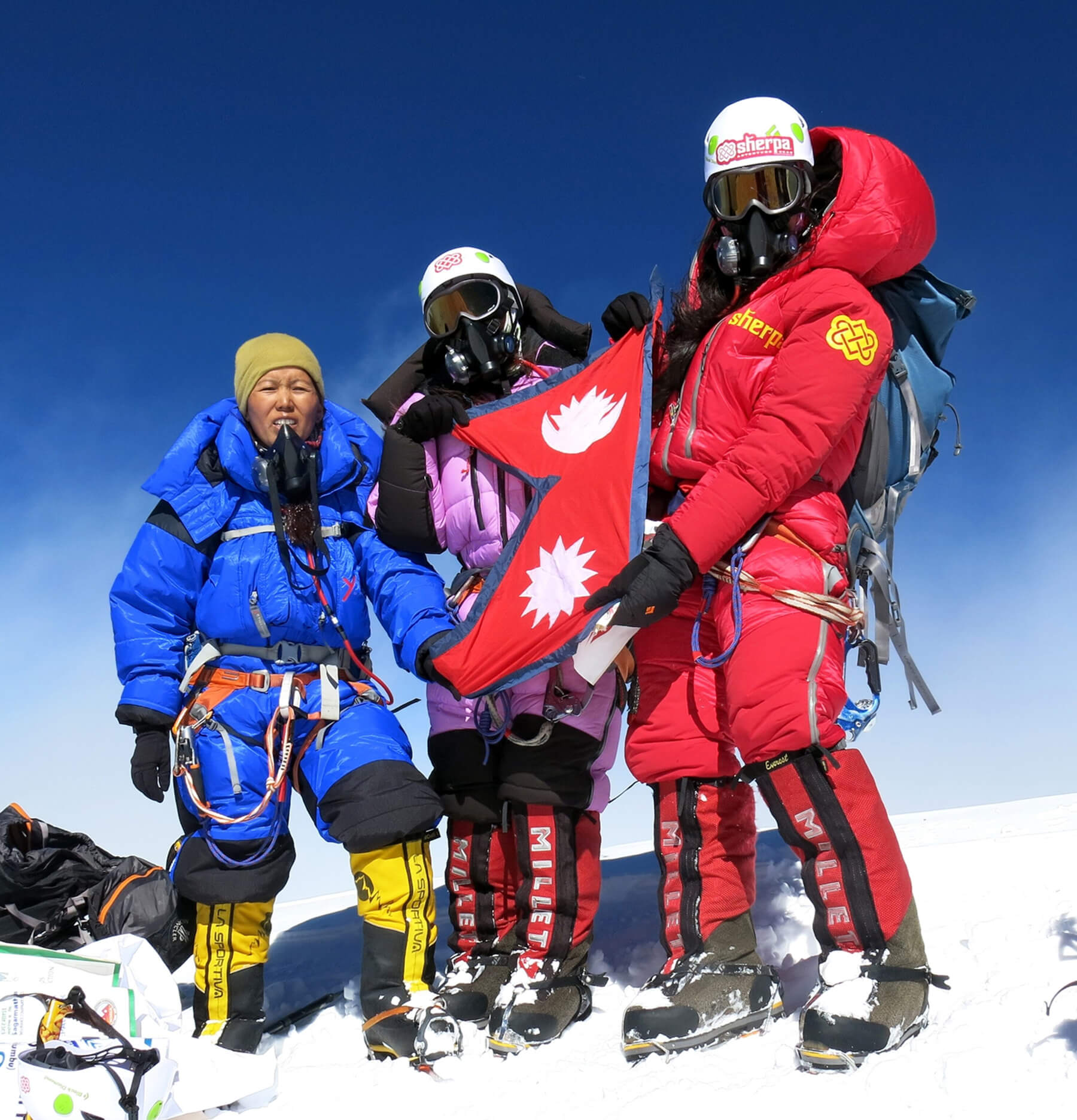
2014: Maya Sherpa, Dawa Yangzum Sherpa and Pasang Lhamu Sherpa [L to R] on the summit of K2
Even after that, I was the last one to get to the Base Camp. So, I had to reconsider if at all I wanted to go for it or if I should make alternate arrangements. I did arrive pretty late at the Base Camp. But I had arrived and I decided I should try it without oxygen this time. Even though I only had two weeks of time, I wanted to see what could be done in such a short span of time. I planned everything out, trained accordingly. I flew in from USA and acclimatised, then went straight to the summit. I'm very fortunate that everything went smoothly in a very short period of time. Also, I believe, being on Mingma G's team made me very confident! My brother was there too. So, I felt confident being next to them. I felt if something goes wrong, they would be there for me. Thankfully, nothing happened and I'm glad I safely made it back to the Base Camp.
DW: You have worked with some of the greatest Alpinists in the world in recent times like Conrad, Emily, and Pasang Lhamu Sherpa. How did they influence you as a climber?
Dawa: Yes, I did work with them. Like
Conrad has been one of the biggest mentors in my life. Emily (Harrington) was my first client on Everest. When Conrad asked me to guide her, we climbed it together.
Since then, I've been working with her. It's been a long time now. About 10 years climbing mountains. I've met Emily and Pasang, all after I met Conrad.
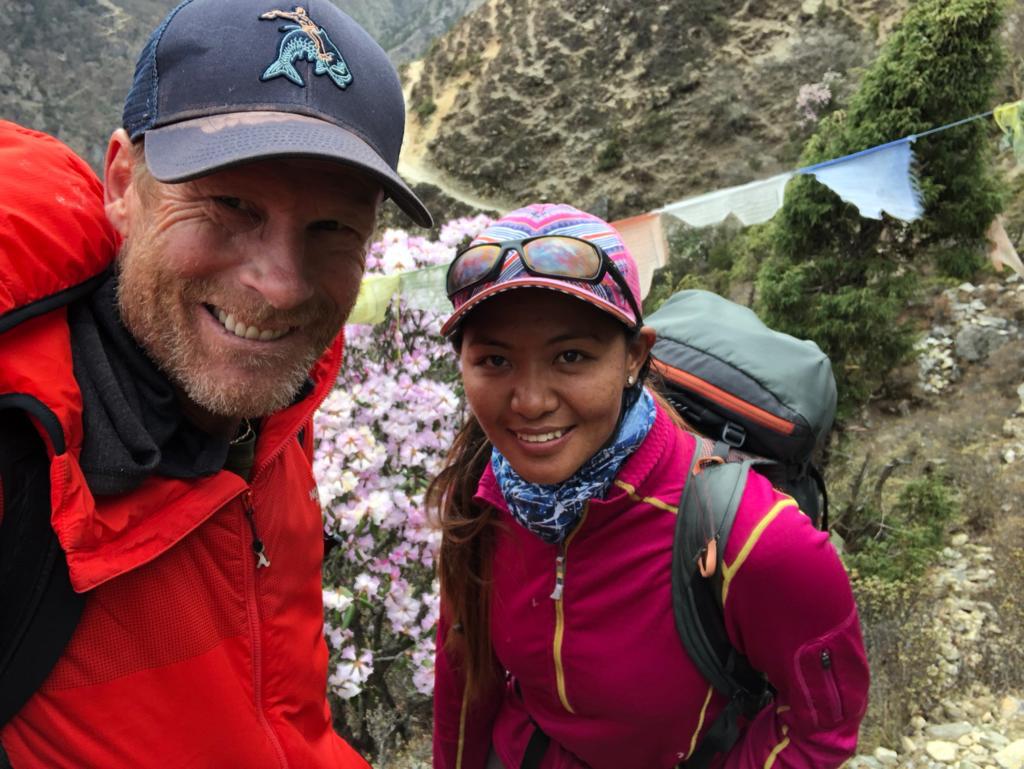
Dawa Yangzum Sherpa with Conrad Anker
DW: Apart from Mingma Gyalje, even your brother Dawa Gyalje is an IFMGA-certified guide. How much influence did the climbers of Rolwaling valley have on you?
Dawa: Yes, I've grown up in the Rolwaling valley. Watching these men go for expeditions and come back was part of my formative years in the valley. But I never knew that I'd climb one day. Almost all men from our valley used to go to these expeditions even before Mingma G and I were little kids. Since then, I've always been curious about where they'd gone to and where they'd climbed. So, growing up and watching them did inspire me a lot. I always heard stories about expeditions from my uncles, cousins, neighbours, and others. I always wanted to know about their experiences and they would tell me that they'd come back after a successful expedition to Everest. So, I must say that those stories subconsciously did influence my younger self. I know many people who used to leave for Everest in Spring and come back in early Summer. That is how I came to know about mountaineering but it took me a long time to decide if I wanted to make a career out of this. But yes,
people of Rolwaling did encourage me because I grew up there.
DW: Mingma G, led his team to the first Winter Ascent to K2 in an all-nepalese team. How do you look at this entire event as a Nepalese Sherpa yourself, and as someone, who hails from the same place where you've grown up in?
Dawa: I think it was one of the proudest moments of this year that Mingma G led his team. He has always been someone very different from our valley. He's always been very eager to do something different. Sometimes he takes up solo climbs or sometimes something even crazier. But we always had great respect for him for pushing the limit for the younger generation. When I started climbing 10 years ago, it was considered a job for someone who doesn't have educational qualification with no choice being left for them. But nowadays, we can see even Mingma G, with a lot of other choices to go towards, chose to climb. So did I. But we love climbing and I think, now, the Nepalese community is accepting that climbing is just a sport and climbers are athletes. We are changing the mindset of people who would just say that climbing is just for the uneducated who had no choice at all. But now the way how people look at climbing is changing.
I believe the younger population is really helping to change the mindset that we are not only under the western world anymore to achieve a successful summit. We can do it ourselves. I think that is the real change that the youth of Nepal is bringing.
And this would be very good for the next generation of Nepalese climbers as well. Maybe 20 years later, for inspiration.
DW: What are your future plans in the Himalayas and other mountain ranges around the world?
Dawa: Nowadays I have been busy guiding but I don't have any bigger plan right now. I'm mostly working with the young climbers. I love climbing with women. I've just come back from Annapurna-1. I've had a trip to my hometown with six other girls. I've been training them for last two years. Now I think they'd be able to climb some difficult peaks.
I am one of the North Face athletes. They helped me a lot with the sponsorship for this expedition. I'm now into climbing higher mountains but at the same time,
I really enjoy training younger girls and making them lean towards not only climbing but also, guiding.
Because if you can guide, you can do it professionally and have a life of your own in this field. I'm helping six girls to climb higher peaks. We are going for a climb in my hometown Rolwaling in two weeks. Some of them are rescued victims of human-trafficking. That's my next project. I hope that the expedition would be great. This is my way of giving back to my community and to the these girls who really look up to me. And in Summer, I guide in North America for last two years.
DW: Your first ascent on Everest in 2012, was with the North Face 50th American Anniversary team and you did it as the first woman from the Rolwaling valley. Besides, being part of the first successful all-female Nepalese team, you've made an impressive climbing résumé for a female climber. Do you want more female climbers from Nepal to come in the forefront?
Dawa: Yeah! My first Everest expedition was in 2012. I started climbing only for Everest. At that time, I used to only train for Everest. I thought to myself that I would be very famous if done so, and then I would leave. I felt no need to keep climbing forever. But it never ended there. After Conrad (Anker) gave me the opportunity to climb Everest, I realised that I am capable of working on Everest. Then I trained hard enough to change my passion into my profession. I feel very fortunate that I get to travel the world as an athlete and I've got great mentors who helped me. If you look back, you won't find many girls with that many opportunities and guidance. Which is why I am helping other girls in the beginning of their career.
And I do want more and more women to come in the forefront as well. Nowadays, a lot of climbers only climb one or two mountains only to give up so early.
DW: Will you continue your career as an individual Nepalese climber or as a Mountain Guide or both?
Dawa:
I'll continue my career as a mountain guide.
I don't know for how long. But I do want to continue doing this. I don't always like to guide though. Sometimes I need a break just to go and climb myself. In those times, I go climbing with my friends. I need to balance it out. It's very hard for women to do so - leading the Guide life and the individual life of our own. Since I'm a professional athlete, sponsored by the North Face, I need to maintain those commitments as well and also, lead my guiding career. Then my normal life as well. I would focus on all those things together - guide a few expeditions, climb myself, and spend time with my family. It is kind of hard but sometimes I really like to just climb without clients and enjoy a break from the guiding.
DW: You made an attempt to Kanchenjunga with your K2 teammates Pasang Lhamu and Maya Sherpa. Do you want to go back again and summit it this time since you had to turn back due to bad weather?
Dawa: I don't know yet. I summited Annapurna-1 and this is my 4th 8000er. I attempted six of them until now and I failed at Kanchenjunga and Cho Oyu. Till now I have climbed Everest, K2, Makalu, and Annapurna-1. Everest was my first one and I hold the title for the youngest female climber to have scaled K2. On Makalu, I had the record of reaching to the summit and coming back in 20 hours. Annapurna-1 was special because I did it without oxygen. Every mountain represents something special. But I don't know if I would do the 14 peaks or not. But I'd like to go back to Kanchenjunga. Because it is a very beautiful mountain where I had to turn back from only 200m below the summit. That was a very sad moment. Maybe I'll think about it next year in Spring.
DW: Thank you for the interview and we wish you a many more years of successful expeditions.
Photo Courtesy: Dawa Yangzum Sherpa






